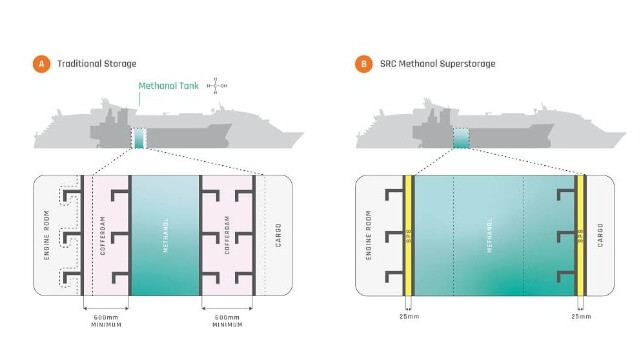Super Fuel Storage Solution for Methanol Reaches the Mainstream

Methanol overtook its rivals as shipping’s preferred decarbonization route for new ships ordered in 2023, but a ‘Methanol Superstorage’ solution means that the fuel type can be integrated into retrofits and newbuilds alike, says Alex Vainokivi, Innovation Manager SRC Group.
DNV and Clarksons’ World Fleet Register show methanol-capable vessels moving ahead of other dual fuel orders for the first time last year, with Chris Chatterton, COO, The Methanol Institute saying 2023 “could fairly be called the year that methanol went mainstream”.
In the container market alone, Alphaliner reported the orderbook for methanol dual-fuel vessels as amounting to 152 ships in the first week of February.
Those committing to methanol as a route to shipping decarbonization do so on practical grounds: here is an alternative to fuel oil which offers lower carbon emissions today and a realistic pathway to net zero. Currently derived principally from natural gas, methanol is available, easy to handle and predictable; once produced renewably, ‘green’ methanol can be a carbon-neutral fuel.
“Choosing methanol is a decision which allows vessel owners and charterers the ability to simply decarbonise faster in a more economically viable manner,” comments Chatterton.
However, it takes around 2.5 times the methanol to achieve energy efficiency equivalent to HFO. A container ship designed to carry 16,500 TEU - typically 366 meters long and 51 meters wide - would ‘lose’ 300 teu as extra fuel storage to sustain conventional bunkering patterns, according to Alphaliner.
True carrying capacity is invariably a matter for speculation when Maersk builds a new containership. In early February, Alphaliner was also puzzling over the precise capacity of Maersk’s new Equinox Class. Shorter than the convention, at 351m in length, these ships are also broader – at 53.5m wide. Alphaliner suggests moving the deckhouse and bridge onto the forecastle, and the funnel to the port aft corner of the hull, recovers carrying capacity by accommodating a full-width methanol fuel tank under bays 16-22.
Space efficient solution
In a very different approach, SRC brought ‘Methanol Superstorage’ to market at the end of 2023 as a solution increasing fuel tank volume by over 85% while having little impact on general arrangement. The proposal met particular enthusiasm after Lloyd’s Register conferred Approval in Principle (AiP), which verifies that no major obstacles have been identified to future certification or classification.
Tanks storing low flashpoint fuels on board ship conventionally require cofferdams of at least 600mm across to separate internal and external walls as a safety precaution. Instead, Methanol Superstorage features 25mm thick tank walls formed by sandwich panel system (SPS) technology – a continuous polymer core injected between two steel surfaces.
The patent protected steel-polymer-steel barrier has been approved for permanent repairs by IACS class societies for over two decades, including for corrosion in ship structures. Class laboratory tests of the polymer core have verified chemical resistance - including for methanol.
“The ability to simplify safe onboard storage of methanol as fuel is a development that we obviously welcome,” says Chatterton. “Choosing SPS technology means being able to load the same amount of energy on board as can be achieved with fuel oil, without any storage penalties, making bunkering operations more efficient in the process.”
Ships in service today – as well as newbuilds - must move towards alternative fuels, if shipping is to meet decarbonization targets set out for it by regulators. Chatterton observes that nearly 300 vessels were booked for alternative fuel retrofitting in 2023.

that matters most
Get the latest maritime news delivered to your inbox daily.
“Shipowners need every possible support on their pathway to net zero carbon,” he adds. “Retrofits are critical to helping the industry adopt methanol now, as it strives to lower emissions and ease compliance with CII and the EU ETS for vessels already in service.”
Alex Vainokivi is Innovation Manager at SRC Group.
The opinions expressed herein are the author's and not necessarily those of The Maritime Executive.
